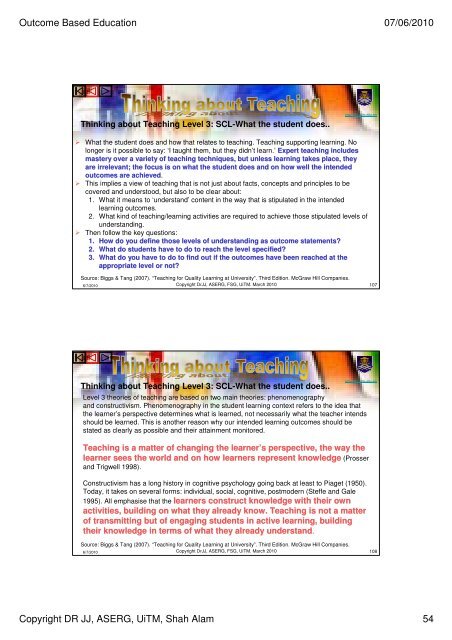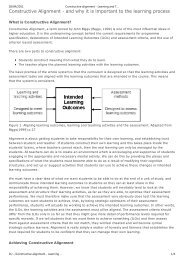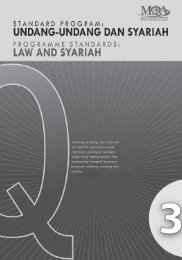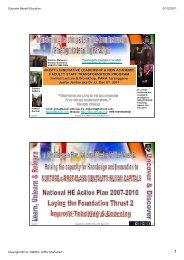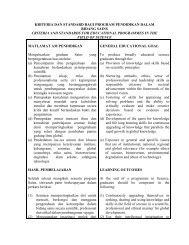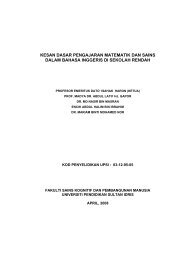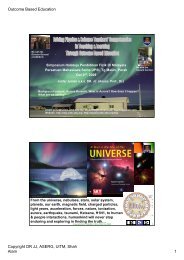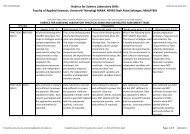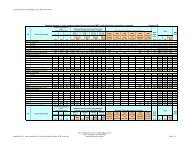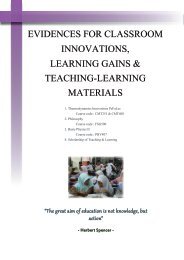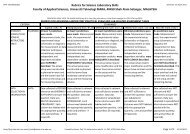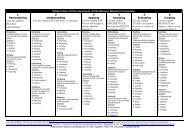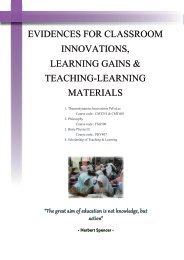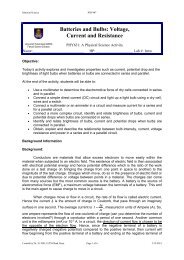FSG-PPT-060610 (pdf) - DrJJ - UiTM
FSG-PPT-060610 (pdf) - DrJJ - UiTM
FSG-PPT-060610 (pdf) - DrJJ - UiTM
Create successful ePaper yourself
Turn your PDF publications into a flip-book with our unique Google optimized e-Paper software.
Outcome Based Education 07/06/2010Thinking about Teaching Level 3: SCL-What the student does..http://drjj.uitm.edu.my What the student does and how that relates to teaching. Teaching supporting learning. Nolonger is it possible to say: ‘I taught them, but they didn’t learn.’ Expert teaching includesmastery over a variety of teaching techniques, but unless learning ng takes place, theyare irrelevant; the focus is on what the student does and on how well the intendedoutcomes are achieved. This implies a view of teaching that is not just about facts, concepts and principles to becovered and understood, but also to be clear about:1. What it means to ‘understand’ content in the way that is stipulated in the intendedlearning outcomes.2. What kind of teaching/learning activities are required to achieve those stipulated levels ofunderstanding. Then follow the key questions:1. How do you define those levels of understanding as outcome statements?2. What do students have to do to reach the level specified?3. What do you have to do to find out if the outcomes have been reached at theappropriate level or not?Source: Biggs & Tang (2007). “Teaching for Quality Learning at University”. Third Edition. McGraw Hill Companies.6/7/2010 Copyright <strong>DrJJ</strong>, ASERG, <strong>FSG</strong>, <strong>UiTM</strong>. March 2010 107Thinking about Teaching Level 3: SCL-What the student does..http://drjj.uitm.edu.myLevel 3 theories of teaching are based on two main theories: phenomenographyand constructivism. Phenomenography in the student learning context refers to the idea thatthe learner’s perspective determines what is learned, not necessarily what the teacher intendsshould be learned. This is another reason why our intended learning outcomes should bestated as clearly as possible and their attainment monitored.Teaching is a matter of changing the learner’s s perspective, the way thelearner sees the world and on how learners represent knowledge (Prosserand Trigwell 1998).Constructivism has a long history in cognitive psychology going back at least to Piaget (1950).Today, it takes on several forms: individual, social, cognitive, postmodern (Steffe and Gale1995). All emphasise that the learners construct knowledge with their ownactivities, building on what they already know. Teaching is not a matterof transmitting but of engaging students in active learning, buildingtheir knowledge in terms of what they already understand.Source: Biggs & Tang (2007). “Teaching for Quality Learning at University”. Third Edition. McGraw Hill Companies.6/7/2010 Copyright <strong>DrJJ</strong>, ASERG, <strong>FSG</strong>, <strong>UiTM</strong>. March 2010 108Copyright DR JJ, ASERG, <strong>UiTM</strong>, Shah Alam 54


